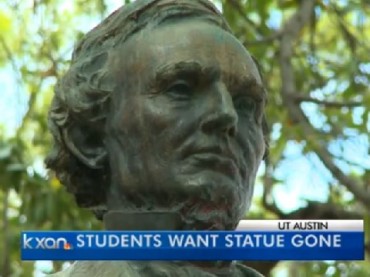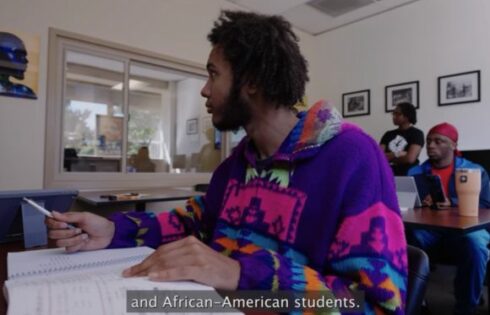
In the wake of South Carolina lawmakers’ decision to remove the Confederate flag from statehouse grounds, the debate over Confederate symbols has extended to colleges across the country – with at least five universities facing calls to remove similar emblems.
The debates are not solely confined to just the Confederate flag, but rather any and all vestiges of the Old South, prompted by the shooting death of nine people in a historically black church in Charleston last month by an alleged white supremacist.
In South Carolina, where the Confederate flag debate has centered, the faculty senate of Clemson University is pushing to rename the university’s Tillman Hall.
Playing a key role in Clemson’s founding, the hall’s namesake, Benjamin Tillman, also served as South Carolina governor from 1890 until 1894 and later as U.S. Senator. But historically, he has been cast as a white supremacist for further restricting black enfranchisement, allowing lynching as governor, and anti-black comments.
“Ben Tillman was complicit or directly responsible for the killing of many black people, an action for which he apparently felt no remorse. Why would we honor this legacy by retaining his name on one of the iconic buildings on campus?” members of the faculty senate wrote on their website.
A similar debate is brewing in California, at UC Berkeley. Students there are calling for both Barrows Hall, which is named after former university president David Barrows, and LeConte Hall, named after brothers Joseph and John LeConte, to be renamed.
The Le Conte brothers, according to the Daily Californian, participated in manufacturing weaponry and ammunition for the Confederate Army during the Civil War.
Calls to rename Barrows Hall began in February, as one of 10 demands the university’s Black Student Union presented to the university administration. The BSU asserted Barrows, a famed anthropologist who had studied in Africa, was an imperialist and a colonialist and demanded the hall be renamed after Assata Shakur, an African-American activist and former member of the Black Panther Party.
“It’s a daily reminder that Black students are not respected on campus,” said BSU member Blake Simons told the Daily Californian. “It’s hypocritical of UC Berkeley to name a building after Martin Luther King, and then have buildings named after slave-owning racists and colonizers.”
Calls to rename Le Conte Hall have followed the Charleston shooting on June 17. John Le Conte was the university’s first president, and his brother Joseph served was a renowned geologist at Berkeley. It’s unclear how the university will respond to the requests, the Daily reports.
The debate has also extended to the Ivy League.
At Yale University, a student petition is seeking to rename the university’s Calhoun College. Named after John Calhoun, the U.S. vice president from 1825 to 1832 and an 1804 Yale grad, the student petition states the former statesman’s defense of slavery warrants a name change to the residential hall.
“At a time when many of his southern colleagues viewed slavery as a necessary evil, Calhoun infamously defended the institution as ‘a positive good,’” the petition states. “Like the official display of the Confederate flag in South Carolina, Calhoun College represents an indifference to centuries of pain and suffering among the black population. It conveys disrespect toward black perspectives, and serves a barrier toward racial inclusiveness.”
As of Monday night, the petition has garnered 1,405 signatures from current Yale students, alumni and others. Yale spokeswoman Karen Peart told the Associated Press that university encourages the discussion the petition has prompted.
“The tragedy in Charleston, on top of countless preceding tragedies in our country’s history, has elevated public opinion and discourse on difficult subjects that have too long been avoided,” Peart said.
While at Clemson, Berkeley and Yale, the debate is over the naming of campus buildings, a university in Utah is facing scrutiny over its name.
At Dixie State University in St. George, Utah, the events in South Carolina have renewed calls to change the university’s name. The university name is a vestige of South Mormons that settled in the region during the 1800s in hopes to grow cotton. Today, some have found the name offensive.
In 2013, the local chapter of the NAACP called for the university to change its name when it became a full-fledged state university. Those calls went unanswered, but the ringing has resurfaced.
In a recent op-ed in The Spectrum, a local paper in Utah, Dixie State psychology professor Dannelle Larsen-Rife renewed calls to rename the university.
“[I] propose we honor the history of the pioneers who settled in this area, and name our university ‘St. George State University, Utah’ after the namesake of the City of St. George, Utah,” Larsen-Rife wrote.
One Dixie State student recently told AP that the university’s name is “a bit of embarrassment.” Even so, the university has no plans to change the name at this point, a spokesman told AP.
In the past, the university has taken steps to tone down its Southern image. In 2009, it changed its moniker from the Rebels to the Red Storm. In 2012, it removed a statue of a soldier waving the confederate flag.
At the University of Texas-Austin, the student government in March passed a resolution calling for the removal of a statue of Confederacy President Jefferson Davis from campus, saying the monument is a “racist symbol of slavery” that’s offensive to many students and not in line with the school’s “core values.”
More recently, the statue has been vandalized and continues to be a source of contention, and calls for its removal resurfaced in late June, a local NBC affiliate reports, adding “in just one day, 1,500 people signed a petition to new UT President Greg Fenves urging him to take down the statue of Jefferson Davis.”
Like The College Fix on Facebook / Follow us on Twitter





Please join the conversation about our stories on Facebook, Twitter, Instagram, Reddit, MeWe, Rumble, Gab, Minds and Gettr.